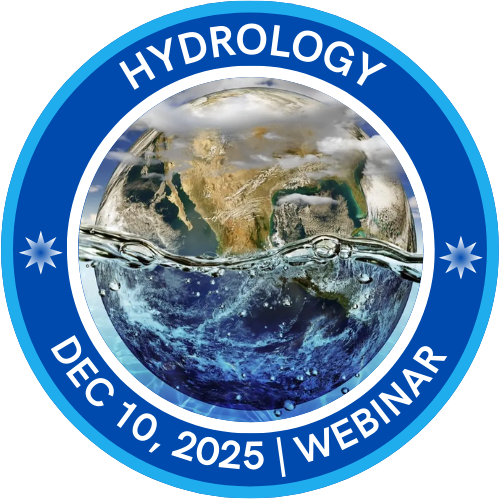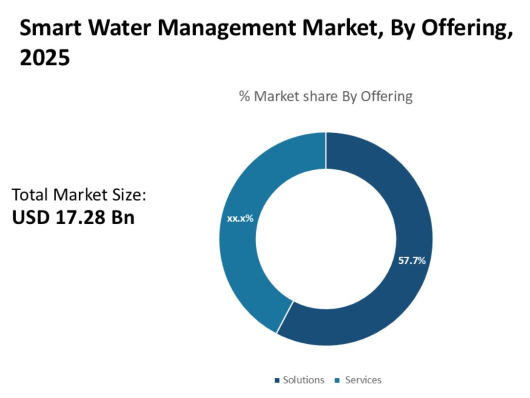"Tracking Invisible Groundwater Depletion"
Welcome to the Global Hydrology and Water Resources Webinar where innovation meets action to safeguard our most vital resource. As climate change reshapes the global water landscape, this event unites leading hydrologists, tech innovators, policymakers, and sustainability experts to explore transformative solutions. From AI-driven drought forecasting to satellite-based groundwater monitoring, we’ll spotlight the technologies redefining modern water management. Dive into critical topics such as cross-border water governance, pollution control, and equitable access to clean water. Whether you're advancing smart irrigation, influencing policy, or driving conservation breakthroughs, this is your space to collaborate, share, and inspire change.
Together, let’s shape a resilient, water-secure future one solution at a time.
The Hydrology and Water Resources Webinar is a global platform dedicated to advancing the science, technology, and policy of sustainable water management. In an era of escalating climate challenges, this event brings together experts from academia, industry, and government to explore innovative solutions for managing water scarcity, improving resilience, and protecting aquatic ecosystems. Through dynamic sessions on smart technologies, data-driven forecasting, water security, and climate adaptation, the webinar fosters cross-sector collaboration and knowledge exchange. From AI-powered monitoring systems to policy frameworks for equitable water access, participants will gain actionable insights to drive impact at local, national, and global levels.
Join us to connect, collaborate, and co-create the future of water.

The fusion of AI and Big Data is transforming hydrology from reactive guesswork to precision water intelligence. Machine learning algorithms now decode complex hydrological patterns, turning flood prediction into a real-time science and groundwater modeling into a dynamic, high-resolution map. With satellite imagery, IoT sensors, and drone networks feeding live data streams, AI detects contamination spikes, forecasts droughts months in advance, and even simulates watershed behavior through digital twin technology. Meanwhile, Big Data crunches petabytes of climate records, soil moisture readings, and urban usage trends unlocking hyper-efficient water distribution strategies and leak detection systems. Yet hurdles like biased datasets, energy-intensive computations, and inequitable tech access remain.
As climate change intensifies droughts, floods, and water scarcity, next-gen systems are blending smart tech, nature-based solutions, and decentralized design to stay ahead. AI-driven networks predict shortages and optimize reservoirs in real time, while modular infrastructure like sponge cities and sand dams absorbs climate shocks. Nature plays a key role: restored wetlands buffer floods, and ancient techniques like chinampas revive sustainable water storage. Communities are leading too, with solar-powered micro-desalination and rainwater harvesting bypassing vulnerable centralized systems. Though challenges like funding and legacy infrastructure remain, the shift is clear resilience means water systems that learn, adapt, and work with nature, not against it. The future isn't just survival it's smarter, distributed, and regenerative.
Climate change and population growth are intensifying pressure on water, energy, and food systems—but cutting-edge WEF Nexus innovations are turning these challenges into opportunities. Solar-powered irrigation slashes energy costs while conserving water, as seen in India’s Gujarat cooperative. Hydroponics and aquaponics reduce water use by 90% and pair with renewables, like Singapore’s closed-loop urban farms. Meanwhile, wastewater-to-energy tech (microbial fuel cells) powers treatment plants while recycling water for crops. AI-driven smart grids optimize resource use—California’s systems adjust irrigation based on real-time weather and soil data. Circular solutions, like the Netherlands’ biogas-from-waste systems, close the loop by converting food waste into energy and fertilizer.
From microplastics to pharmaceuticals, emerging contaminants are redefining water quality threats worldwide. This session explores cutting-edge detection technologies, risk assessment frameworks, and innovative treatment solutions to tackle pollutants that evade traditional systems. As science uncovers what was once invisible, the future of clean water demands sharper tools, smarter policies, and stronger public awareness.
Modern cities are transforming into intelligent water ecosystems, where technology and nature converge to combat flooding, pollution, and scarcity. Digital twin technology allows engineers to simulate catastrophic flood scenarios in real time, optimizing drainage networks before disasters strike. On the ground, autonomous drones patrol gutters, clearing blockages and mapping vulnerabilities, while experimental projects like Rotterdam’s water squares turn flood zones into vibrant public spaces during dry seasons. The frontier of urban hydrology includes floating treatment wetlands that purify water while boosting biodiversity, blockchain-enabled storm water trading between buildings, and smart sensors that monitor road salt contamination. The cities of tomorrow demand more than pipes and pumps; they require dynamic, self-regulating water systems embedded in the urban fabric, where every street, roof, and park becomes an active player in water resilience.
A quiet crisis is unfolding underground overdrawn aquifers and creeping contamination threaten global water security. But a wave of innovation is rewriting the story. Satellites like GRACE now monitor groundwater loss in real time, while AI helps farmers cut irrigation waste without hurting yields. Floodwaters are being stored underground through smart recharge systems, and new tech like solar nanofilters and electrokinetic barriers is making clean water accessible and sustainable. Even blockchain is entering the scene, turning saved groundwater into tradable credits. Yet legal loopholes and climate unpredictability still challenge progress.
In a climate-challenged world, ecohydrology is redefining how we manage water viewing rivers, wetlands, and watersheds as living ecosystems, not just resources. From environmental flows that revive dry deltas to beaver-inspired structures restoring natural water cycles, smart hydrology is bringing landscapes back to life. Cities are joining in too, turning storm drains into green corridors that reduce floods and boost biodiversity. Climate-smart wetlands now multi task storing carbon, filtering pollutants, and supporting wildlife, as seen in Kenya’s Tana Delta. But hurdles remain: outdated policies still sideline nature, and invasive species threaten gains.
The Blue Circular Economy transforms water from a finite resource into a renewable, zero-waste system. Cities now treat wastewater as a resource Singapore’s NEWater and Amsterdam’s smart grids recycle water endlessly, while industries turn waste into energy and raw materials. Breweries convert spent grain to biogas, and textile factories filter/reuse water in perpetual loops. Nature powers solutions too: constructed wetlands clean runoff while boosting biodiversity and oyster reefs filter pollutants naturally. Cutting-edge tech mines wastewater for lithium and 3D-prints coral reefs to restore oceans.
Beneath the surface lies a critical yet often overlooked resource groundwater. This session explores the science, technology, and policy innovations revitalizing aquifer management. From AI-powered recharge modeling to community-led conservation, discover how we're safeguarding the world’s most vital underground reserves.
Mountain regions often called the world’s water towers are under pressure as glaciers retreat and snowmelt patterns shift. This session dives into cryohydrology, exploring how ice, snow, and permafrost drive hydrological cycles and impact billions downstream. From satellite monitoring to community adaptation, we uncover what it takes to manage high-altitude water in a warming world.
Where rivers meet the sea, hydrology becomes both complex and critical. Coastal and deltaic zones are facing rising seas, salinity intrusion, land loss, and shifting sediment flows. This session explores how science, technology, and community resilience are shaping the future of these dynamic and vulnerable systems—from mangrove restoration to delta modeling and coastal flood forecasting.
From AI-powered water grids to atmospheric water harvesters, the future of water is smarter, cleaner, and more connected. This session showcases cutting-edge innovations transforming how we source, purify, distribute, and conserve water. Explore how tech is bridging gaps in access, efficiency, and sustainability—reshaping global water futures in real time.
Our webinars are thoughtfully designed to deliver value to a wide range of individuals. Whether you're looking to grow your skills, explore new opportunities or gain insights from experts, here's who will benefit most from attending:
If you're aiming to advance in your career or stay updated with the latest trends in your field, this webinar is perfect for you. Gain actionable insights and learn from industry experts.
Professors, scholars, and students presenting findings or exploring the latest research in their field and individuals looking for collaboration opportunities.
Discover strategies, tools, and techniques to scale your business, enhance productivity, and achieve your goals. This is your chance to learn from real-world success stories.
Are you curious about new concepts or looking to bridge the gap between academia and industry? Our webinars provide practical knowledge that goes beyond textbooks.
Stay ahead of the curve! If you're passionate about the topic and want to understand the latest innovations, trends, or developments, you'll find immense value here.
In a world where knowledge is power, webinars have emerged as one of the most accessible and impactful ways to learn, grow and connect. Don't miss the chance to learn, grow and connect in ways that truly matter.
Webinars are often hosted by industry experts, thought leaders, and innovators. Attending gives you direct access to their insights, strategies, and expertise that you can immediately apply in your personal or professional life.
The digital world evolves rapidly. Webinars provide up-to-date information on the latest trends, tools, and techniques, ensuring you stay ahead of the curve in your industry or area of interest.
Webinars aren't just passive presentations they're dynamic and interactive. Participate in live Q&A sessions, answer polls, and share your thoughts with like-minded participants.
Webinars connect you with professionals, experts, and enthusiasts from around the globe. It's a unique opportunity to grow your network and collaborate with others who share your interests.
Many webinars are free or available at a fraction of the cost of in-person events. This makes them an affordable way to learn from experts without incurring travel or accommodation expenses.
Webinars often include access to resources such as presentation slides, e-books and recordings. These materials ensure you can revisit the content and reinforce your learning anytime.
A great webinar can spark new ideas and reinvigorate your passion for a topic. The insights you gain may open new opportunities or provide the push you need to achieve your goals.
Webinars are designed with specific audiences in mind. Whether you're seeking professional development, personal growth, or technical know-how, you're likely to find a webinar that suits your interests perfectly.
Stay ahead of the curve! If you're passionate about the topic and want to understand the latest innovations, trends, or developments, you'll find immense value here.
Best platform for Global business and Networking opportunities B2B Meetings Poster Sessions on every career stage Networking Opportunities
Registering for a webinar is essential to gain access to the unique opportunities and secure a chance to grow, connect and gain insights that can drive your personal and professional success. Webinars are more than just online meetings, they're gateways to knowledge, innovation, and growth.

The global hydrology and water resources sector is rapidly transforming in response to rising water scarcity and climate extremes, affecting over 2 billion people. With the smart water management market projected to hit $42.7 billion by 2030, innovations like AI-driven leak detection, IoT water monitoring, and satellite-based mapping are leading the way. Yet, challenges such as aging infrastructure and funding shortfalls especially in developing regions—persist. Despite this, emerging solutions like atmospheric water generation and decentralized treatment systems are gaining momentum.
The future lies in blending climate resilience with digital innovation to build smarter, more sustainable water systems for cities, agriculture, and industry alike.





